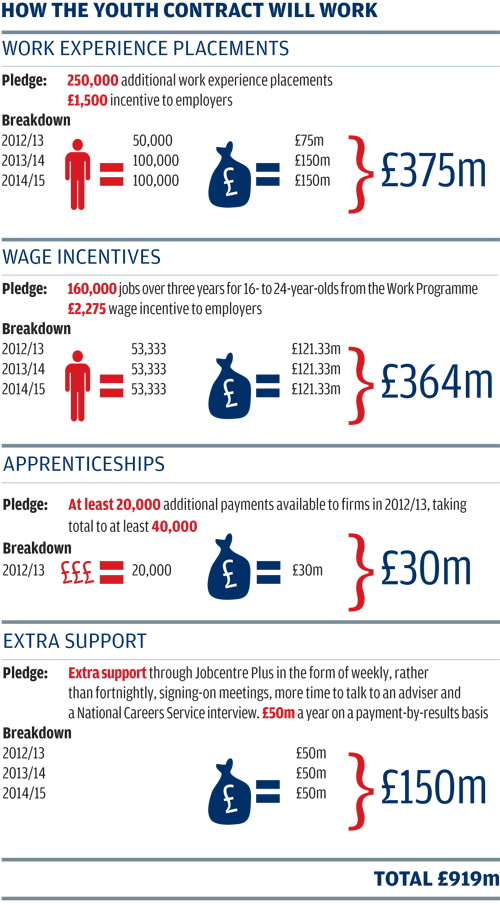Can the Youth Contract unlock young people's potential?
Neil Puffett
Monday, January 9, 2012
With youth unemployment rising to record levels, attempts to tackle the issue formed a key plank of the government's autumn statement stimulus package.

The £1bn Youth Contract will include moves to get more young people into work experience, jobs and apprenticeships through incentives for employers, with additional support for the most vulnerable 16- and 17-year-olds.
WORK EXPERIENCE
Often described as a "chicken-and-egg" scenario, many young people struggle to gain employment without experience in the workplace.
The government is attempting to address this through the work experience strand of the Get Britain Working strategy. But under the Youth Contract, an additional 250,000 places will be provided over three years, with employers offered a £1,500 incentive for each young person they take on.
A placement of up to eight weeks will be offered to every unemployed 18- to 24-year-old who wants it, after they have been claiming Jobseeker’s Allowance (JSA) for three months and prior to entering the Work Programme.
But young people could lose their entitlement to benefits if they drop out.
Exactly how successful work experience will prove in securing long-term employment has been questioned and concerns have been raised that young people are being used as "cheap labour" by businesses in unskilled roles that provide them with little benefit.
The government points to an early Department for Work and Pensions study of the scheme, which shows the number of young people claiming benefits dropped from 98 per cent at the start of work experience to 49 per cent after 13 weeks from a base of 1,300 participants.
However, the report does not reveal whether the drop relates to benefits ceasing because a young person did not complete the placement, rather than because they found employment.
The Foyer Federation says it is crucial that work placements are of high quality, and enable "positive and sustainable transition into the workplace".
"The government risks alienating young people if the contract is exploitative, unconstructive or is seen to be so," says Jane Slowey, chief executive of the Foyer Federation. "It must be a genuine something-for-something deal. Given the risk of benefits being withdrawn if the work experience programme is not completed, young people must be given sound advice and guidance and there must be controls to ensure placements are suitable."
WAGE INCENTIVES
Incentives for firms who take on young workers are nothing new. Indeed, Labour’s £1bn Future Jobs Fund, which offered employers up to £6,500 for a guaranteed six-month work placement, was axed by the coalition government as recently as March last year.
In cancelling it, the government said the initiative did not offer value for money to the taxpayer as it created temporary, short-term placements, and the grants did not include any incentives to move people into permanent employment.
But an early Department for Work and Pensions study of the scheme concluded that it was successful in preparing participants for work and had some long-lasting effects.
The wage incentive aspect of the Youth Contract will attempt to secure jobs for young people in much the same way, but will aim the incentives at private firms rather than the public sector.
From April, incentives of £2,275 will be available to employers who take on young people from the Work Programme, meaning they must have been claiming JSA for at least nine months.
The British Chambers of Commerce believes the proposal will help businesses offset the associated cost of training up young people not in employment, education or training.
But it argues that more fundamental reform is necessary if young people are to be taken on by firms. "Our research tells us that employers lack confidence in the education system," says Dr Adam Marshall, the body’s policy director.
"In a recent survey of more than 6,000 businesses, only 29 per cent felt very or fairly confident in recruiting school-leavers with A-levels or the equivalent. Many firms are working hard to invest in young people in their local areas, but too often we hear that they are ill-equipped for the workplace."
On the flip side, there are also fears that young people could end up in positions that do not allow them to fulfil their potential.
Faiza Chaudary, deputy chief executive at the National Council for Voluntary Youth Services, says that while the Youth Contract is "positive and constructive", it "should be about young people reaching their full potential, not getting them off the [unemployment] statistics".
APPRENTICESHIPS
The Youth Contract doubles the number of incentive payments available to small firms offering apprenticeships from 20,000 to 40,000 for 2012/13.
Payments of up to £1,500 will be made to businesses employing up to 50 staff that take on a young apprentice for the first time.
Payment will be geared to encourage sustainable employment with an initial payment made two months after the start of an apprenticeship and the balance paid on completion, once the trainee has progressed into employment.
Notwithstanding the additional £30m in funding to provide 20,000 more incentive payments, a key issue for the success of apprenticeships is awareness of their existence.
A survey by the Association of Colleges found that only seven per cent of school pupils could name apprenticeships as a post-GCSE qualification.
This sparked an inquiry by the All Party Parliamentary Group on Further Education, which recommended that inspirational former apprentices, such as chef Gordon Ramsay, should be approached to act as "apprenticeship champions" to visit schools and talk about how their experience as an apprentice has underpinned their success.
The government has also committed to reducing bureaucracy to simplify the process of taking on apprentices, and offering training in English and maths for all apprenticeships.
But analysis by CYP Now of latest government figures on participation suggests that despite the introduction of incentive payments, the rate of growth in apprenticeships witnessed since 2008/09 is slowing.
The government’s participation strategy reveals that £833m has been set aside to fund up to 140,200 new apprenticeships for 16- to 18-year-olds in 2012/13.
This represents a 9.3 per cent increase on apprenticeship starts since 2010/11 when the figure was 128,300. This is less than the 9.8 per cent increase between 2009/10 to 2010/11 and significantly lower than the 17.5 per cent increase from 2008/09 to 2009/10.
EXTRA SUPPORT
Amid concerns that 16- and 17-year-olds are missing out on existing initiatives, extra support will be provided for some of the most vulnerable who are not in education, employment or training. This will include young people with low qualifications, those with learning difficulties and/or disabilities, teenage parents and those who have been out of work or training for a long period.
Funding of £150m will be provided over three years (£126m of which has been earmarked for England) on a payment-by-results basis to help 25,000 young people a year.
The government’s participation strategy, published in December, reveals that the additional support will link in with existing programmes aimed at troubled families such as family intervention projects.
Support will be delivered by private, voluntary or community organisations, or even social enterprises – with the "majority of payment" based on results.
But the finer details of how the system will work are unclear. Payment-by-results is still a fledgling concept and concerns are lingering over the potential for "perverse incentives".
The tight time frame also offers support providers little time to formulate sufficient services. But the Association of Employment and Learning Providers (AELP) says existing organisations should be ready to meet the challenge.
"Payment-by-results shouldn’t pose a challenge to our members, the challenge is finding employers," an AELP spokesman said.
Providers that do get involved will be given the freedom to engage young people in whatever way works best for them.
But it is already being argued that the new support package does not go nearly far enough. "Unemployment for this group has doubled over the past decade and there are currently 217,000 unemployed individuals, meaning that the money announced will help just 11 per cent of those 16- and 17-year-olds out of work," says Anne Marie Carrie, chief executive of Barnardo’s.
Barnardo’s wants the government to introduce a range of further measures including clear programmes through post-16 education, employment and training. It has also called on local authorities in England to use the early intervention grant to support disengaged 16- and 17-year-olds into employment and training.





